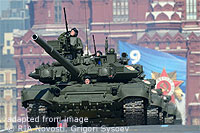Russia puts spending on guns ahead schools

(Business New Europe – bne.eu – MOSCOW BLOG – July 9, 2013) The Russian government has just approved the next three-year budget that runs to 2016 that has cut spending on education and health in favour of boosting it on reequipping the armed forces.
Relations between Russia and the west are probably at their lowest ebb since the fall of the Soviet Union. Russia’s refusal to hand over the former NSA agent Edward Snowden hold up in the departure lounge of Moscow’s Sheremetyevo airport has incensed the US government and is only the latest in a string of PR disasters that have rubbed salt into a very raw wound.
The Obama administration’s attempt to “reset” relations with Moscow has failed. Russian President Vladimir Putin definitely said that time has run out at the Kremlin’s St Petersburg Economic Forum last year and Russia will no long reach out and try to be “friends” with the west. Instead it has definitely turned eastward to China to build a its strategic partnership and while the west is not exactly an “enemy” Russia clearly no longer trusts the west to help it in any way other than as a business partner.
All of this is manifest in Putin’s commitment to reequipping the Russian armed forces. A new Cold War has started. If relations are going to be prickly Putin feels that he needs strong conventional army so Moscow has a stick to stand behind any strong words that are exchanged.
Russia has massively expanded its military spending, but the increasingly cash-strapped government, which is only just in profit thanks to the global economic slowdown, has had to cut spending on other areas to pay for the new warships, planes and missile systems.
Fittingly enough on July 4, while America celebrated its independence day the Russian ministry of finance submitted a proposal for spending through to 2016.
“While the overall framework is prudent in nature as it formally preserves the fiscal rule, it reveals a worrying (and significant) distribution of expenditures away from much needed education and health towards defense and national security,” said Ivan Tchakrov, chief economist for Russia and the CIS at Renaissance Capital.
The military expenditure share of overall government spending has been dramatically increased from 15.7% of the total spending in 2013 to 22% in 2016.
As a share of GDP this means a rise from 3.2% of GDP to 3.8%, which is much higher than the rest of Europe, but still slightly behind the US which spends a bit more than 4% of its GDP on its military.
The increase in spending represents a shift in military power in the world that is seeing Russia growing more powerful. The US was running a debt to GDP ratio of 107% in 2012, according to the World Organisation of Creditors, or $53,229 per person against Russia’s 11% of GDP, or $1,544 per person. Under the weight of this massive debt America has been forced to dramatically cut back on its military spending. The situation in western Europe is even worse which is labouring under similar debt levels. To Washington’s alarm almost all of the NATO allies in Europe have cut their military spending to below 2% of GDP that they are required to maintain under the terms of the treaty.
However, Russia cannot afford all this spending and has had to make cuts elsewhere.
“The share of health spending falls from almost 4% in 2013 to only 2.2% in 2016. Similarly, education spending is reduced to 3.9% in 2016 from 5.1% in 2013. This is particularly concerning as Russia already lags EM peers (SA, Brazil, Poland and Mexico) in education expenditures and Brazil, SA, Poland, Turkey and Mexico in health spending,” says Tchakrov. “Thus, the budgetary framework entrenches already existing structural weaknesses and poses longer-term risks to the development of Russia as a genuinely competitive global EM economy.’
With this budget Putin has sacrificed long-term economic development that comes with high education and health levels for a short-term military catch up in power. It is a testament to the poor relations that the Kremlin feels it needs to rearm a process that will take a decade to complete by the Kremlin’s own admission before it can turn to the task of rebuilding the Russian economy for long-term prosperity.
